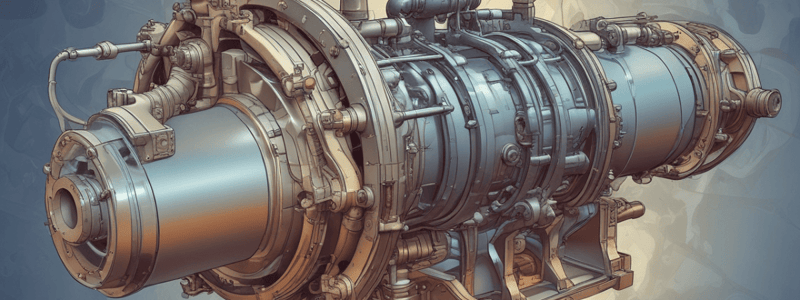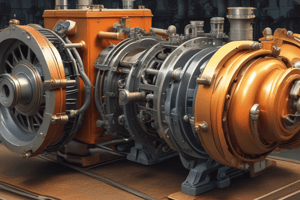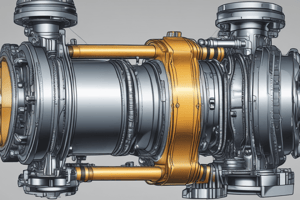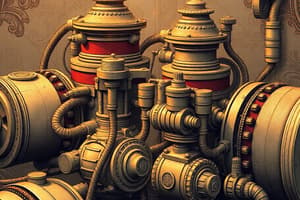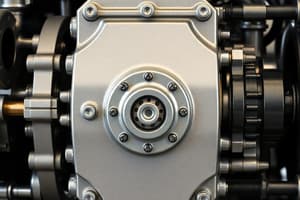Podcast
Questions and Answers
What is the primary mechanism by which a reciprocating pump displaces fluid?
What is the primary mechanism by which a reciprocating pump displaces fluid?
- Linear motion (correct)
- Centrifugal force
- Vibrational force
- Rotating motion
What type of flow does the reciprocating motion of the piston create within a reciprocating pump?
What type of flow does the reciprocating motion of the piston create within a reciprocating pump?
- Turbulent flow
- Laminar flow
- Pulsating flow (correct)
- Steady flow
In a reciprocating pump, what happens during the suction stroke?
In a reciprocating pump, what happens during the suction stroke?
- The piston moves towards the cylinder head
- The suction valve opens and fluid is forced out
- Fluid is drawn into the cylinder (correct)
- A high-pressure area is created
What role do suction and discharge valves play in a reciprocating pump?
What role do suction and discharge valves play in a reciprocating pump?
Which term best describes reciprocating pumps in relation to fluid delivery per stroke?
Which term best describes reciprocating pumps in relation to fluid delivery per stroke?
What component of a reciprocating pump is responsible for creating a high-pressure area during the discharge stroke?
What component of a reciprocating pump is responsible for creating a high-pressure area during the discharge stroke?
Which type of pump generates a pulsating flow due to its operating mechanism?
Which type of pump generates a pulsating flow due to its operating mechanism?
What is the main principle of operation for a centrifugal pump?
What is the main principle of operation for a centrifugal pump?
In terms of flow rate and pressure, which type of pump is suited for high-pressure applications?
In terms of flow rate and pressure, which type of pump is suited for high-pressure applications?
What is a common application where centrifugal pumps are commonly used?
What is a common application where centrifugal pumps are commonly used?
Which type of pump generally has higher efficiency for low to moderate pressures and high flow rates?
Which type of pump generally has higher efficiency for low to moderate pressures and high flow rates?
What component may need frequent inspection and replacement in a reciprocating pump due to wear and tear?
What component may need frequent inspection and replacement in a reciprocating pump due to wear and tear?
Which pump is more suitable for applications requiring high flow rates such as HVAC systems?
Which pump is more suitable for applications requiring high flow rates such as HVAC systems?
Which pump operates by moving a plunger back and forth within a cylinder?
Which pump operates by moving a plunger back and forth within a cylinder?
What type of pump is typically considered more reliable for continuous operation?
What type of pump is typically considered more reliable for continuous operation?
Which pump type requires additional components like pulsation dampeners to smooth out the flow due to significant pulsations in its operation?
Which pump type requires additional components like pulsation dampeners to smooth out the flow due to significant pulsations in its operation?
Flashcards are hidden until you start studying
